

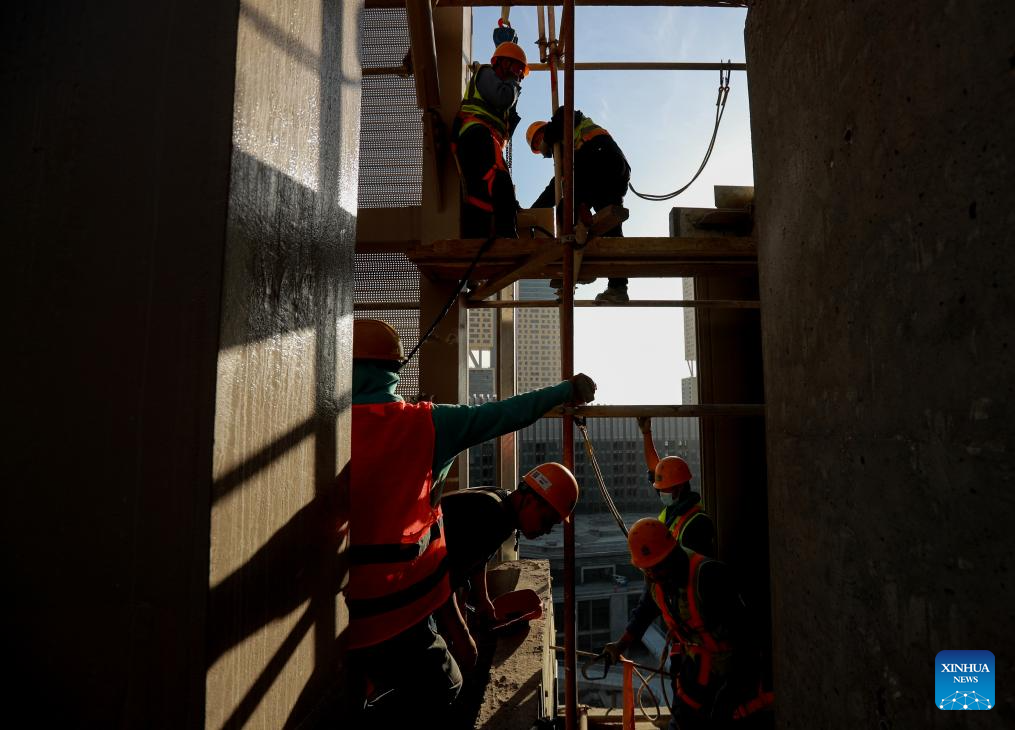
Workers install the curtain wall at the Central Business District (CBD) of Egypt's new administrative capital, 45 kilometers east of Cairo, Egypt, Nov. 22, 2023. In the vast and scorching desert in North Africa, Chinese and Egyptian workers are working against the clock to dress up a cluster of newly erected high-rises in glass walls made in China.
The new capital is not only a key project of the China-proposed Belt and Road Initiative but also the largest project constructed by Chinese companies in Egypt.
After four years of construction, the modern city is finally taking shape, with a cluster of glass buildings shining like a mirage amidst the arid landscape.
Located near the Sahara Desert, Egypt's climate is predominantly hot and dry, and the highest temperature can reach 50 degrees Celsius in summer. Under such an extreme environment, installing glass walls for these skyscrapers requires impeccable craftsmanship and top-notch materials, in which Chinese builders have stood out when compared to their Western counterparts.
By the spring of next year, all the curtain walls of the CBD will be installed completely. The CBD will continue to radiate the glory of the China-Egypt friendship, serving as an enduring symbol of the Belt and Road Initiative. (Xinhua/Sui Xiankai)
by Xinhua writer Shen Danlin
CAIRO, Nov. 27 (Xinhua) -- In the vast and scorching desert in North Africa, Chinese and Egyptian workers are working against the clock to dress up a cluster of newly erected high-rises in glass walls made in China.
Here is the Central Business District (CBD) of Egypt's new administrative capital, 45 kilometers east of the Egyptian capital of Cairo. The new capital is not only a key project of the China-proposed Belt and Road Initiative but also the largest project constructed by Chinese companies in Egypt.
After four years of construction, the modern city is finally taking shape, with a cluster of glass buildings shining like a mirage amidst the arid landscape.
Located near the Sahara Desert, Egypt's climate is predominantly hot and dry, and the highest temperature can reach 50 degrees Celsius in summer.
Under such an extreme environment, installing glass walls for these skyscrapers requires impeccable craftsmanship and top-notch materials, in which Chinese builders have stood out when compared to their Western counterparts.
"Stunned by our price, quality, and speed, they have no reason not to choose us," Cheng Wei, the manager of Egypt's CBD project of China Construction Shenzhen Decoration company, told Xinhua.
"Price is our most straightforward advantage," Cheng said, explaining, "For example, the price of a square meter glass curtain wall produced and installed by European and American companies doubled that of Chinese counterparts."
Nevertheless, lower prices do not equate to compromised quality. According to Cheng, China-produced curtain walls, in many performance tests, such as air and water tightness, plane deformation, and wind load resistance, not only meet but often surpass the standards set by European and American companies, exhibiting superior performance in certain aspects.
To earn the complete trust of the CBD designers from Dar Al-Handasah, a world-renowned consulting organization in architecture and planning, Cheng and his colleagues invited them to visit the curtain wall factories and megacities in China.
"A Chinese factory can rival a small town in size, leaving them awestruck," Cheng said with a hint of pride, noting, "Having visited the United States previously, these designers were astounded to discover that China's resplendent skyscrapers are no less impressive."
The speed at which the Chinese builders operate also leaves an indelible impression on their Egyptian clients. In Egypt, the conventional construction concept dictates that curtain walls are installed only upon the completion of the main structure.
"Our concept is, you build the third floor, we install the curtain walls on the first floor; you build the 20th floor, we go to the 15th floor. Much to their surprise, they found that this methodology is entirely feasible," Cheng said.
With excellent techniques and quality, Chinese builders and products totally changed the attitude of their clients, from doubt in the very beginning to conviction and trust.
"They rarely come to the site now, and they said our products are exempt from inspection," Cheng said confidently.
Although not fully completed, the CBD of Egypt's new administrative capital has become a popular Instagram-worthy location for Egyptian people, and they gave the 385.8-meter-high landmark building a nickname, "China Tower."
Xu Xiaoxiao, a project manager of China Construction Shenzhen Decoration company, told Xinhua that the Egyptian workers said the pyramids are attractions for foreigners, and the "China Tower" is an attraction for Egyptians.
"When you take a taxi in Cairo and tell the driver to go to the new administrative capital, many drivers do not know where it is. Tell them 'China Tower,' and all the drivers know the place," Xu said with a smile on his face.
By the spring of next year, all the curtain walls of the CBD will be installed completely, and Cheng Wei and Xu Xiaoxiao will then bid farewell to Egypt and return home. However, the magnificent "pearl of the desert" they have constructed will continue to radiate the glory of the China-Egypt friendship, serving as an enduring symbol of the Belt and Road Initiative.
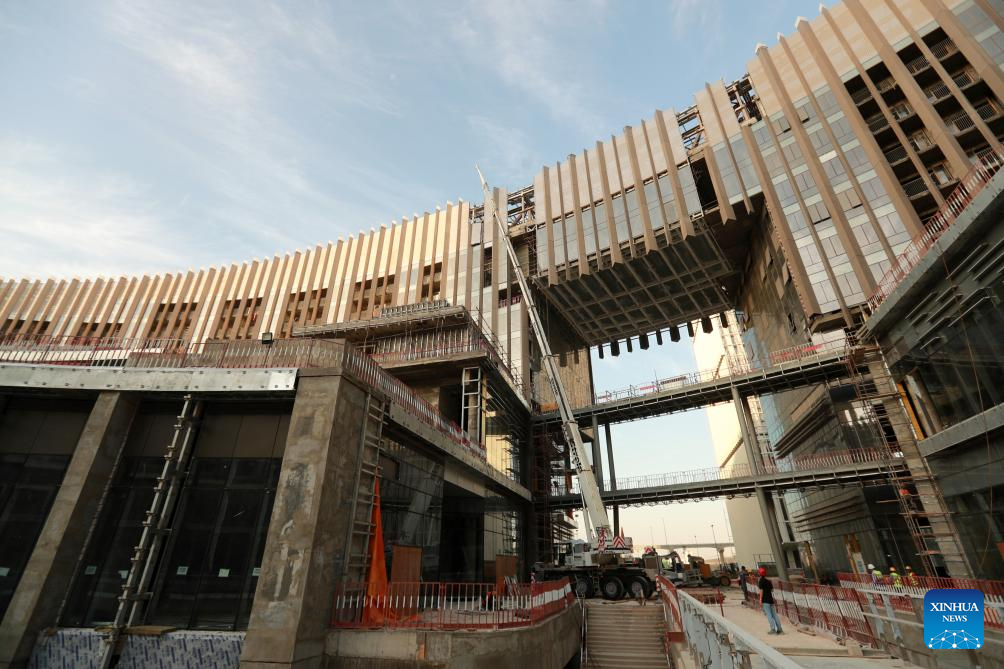
This photo taken on Nov. 22, 2023 shows the installation work of the curtain walls at the Central Business District (CBD) of Egypt's new administrative capital, 45 kilometers east of Cairo, Egypt. In the vast and scorching desert in North Africa, Chinese and Egyptian workers are working against the clock to dress up a cluster of newly erected high-rises in glass walls made in China.
The new capital is not only a key project of the China-proposed Belt and Road Initiative but also the largest project constructed by Chinese companies in Egypt.
After four years of construction, the modern city is finally taking shape, with a cluster of glass buildings shining like a mirage amidst the arid landscape.
Located near the Sahara Desert, Egypt's climate is predominantly hot and dry, and the highest temperature can reach 50 degrees Celsius in summer. Under such an extreme environment, installing glass walls for these skyscrapers requires impeccable craftsmanship and top-notch materials, in which Chinese builders have stood out when compared to their Western counterparts.
By the spring of next year, all the curtain walls of the CBD will be installed completely. The CBD will continue to radiate the glory of the China-Egypt friendship, serving as an enduring symbol of the Belt and Road Initiative. (Xinhua/Sui Xiankai)
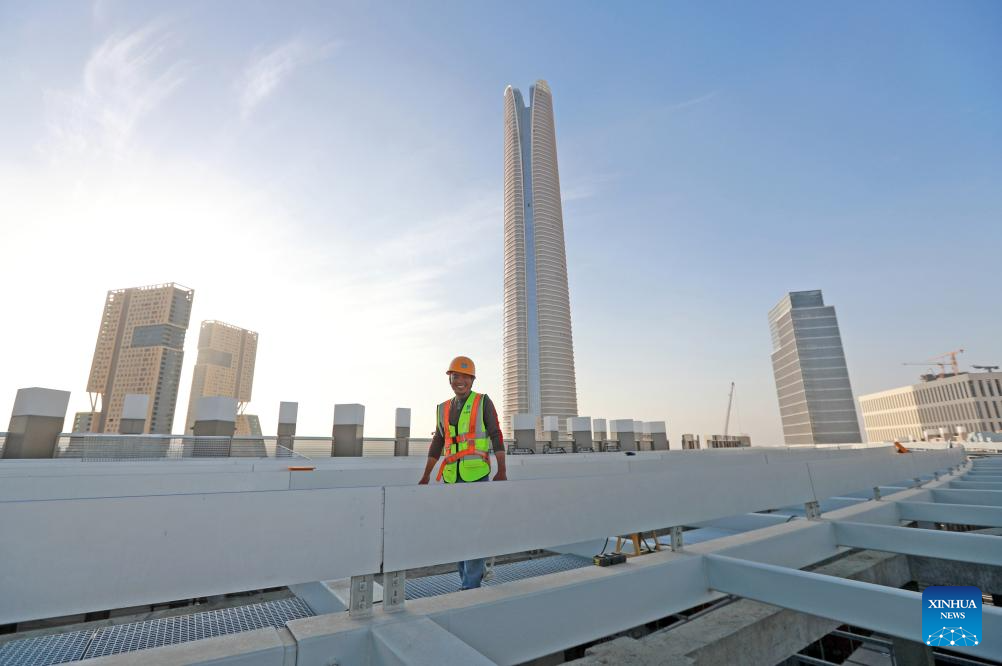
A Chinese worker is seen at the construction site of the Central Business District (CBD) of Egypt's new administrative capital, 45 kilometers east of Cairo, Egypt, Nov. 22, 2023. In the vast and scorching desert in North Africa, Chinese and Egyptian workers are working against the clock to dress up a cluster of newly erected high-rises in glass walls made in China.
The new capital is not only a key project of the China-proposed Belt and Road Initiative but also the largest project constructed by Chinese companies in Egypt.
After four years of construction, the modern city is finally taking shape, with a cluster of glass buildings shining like a mirage amidst the arid landscape.
Located near the Sahara Desert, Egypt's climate is predominantly hot and dry, and the highest temperature can reach 50 degrees Celsius in summer. Under such an extreme environment, installing glass walls for these skyscrapers requires impeccable craftsmanship and top-notch materials, in which Chinese builders have stood out when compared to their Western counterparts.
By the spring of next year, all the curtain walls of the CBD will be installed completely. The CBD will continue to radiate the glory of the China-Egypt friendship, serving as an enduring symbol of the Belt and Road Initiative. (Xinhua/Sui Xiankai)
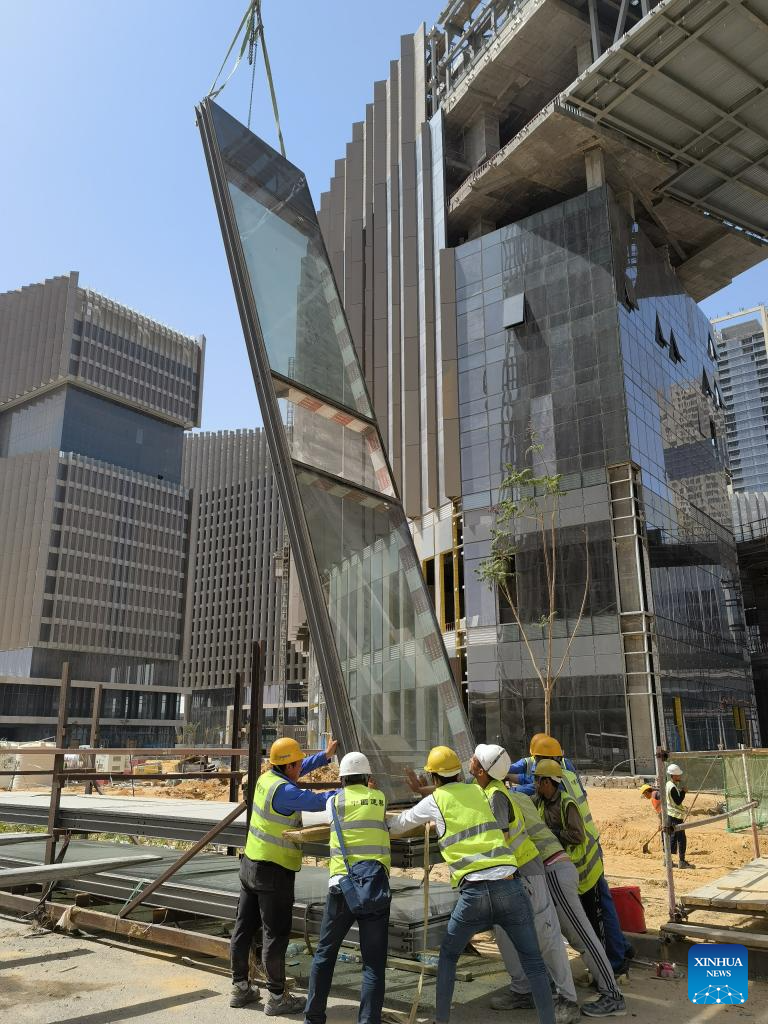
This cellphone photo taken on June 4, 2023 shows workers carrying out hoisting work of the curtain walls at the Central Business District (CBD) of Egypt's new administrative capital, 45 kilometers east of Cairo, Egypt. In the vast and scorching desert in North Africa, Chinese and Egyptian workers are working against the clock to dress up a cluster of newly erected high-rises in glass walls made in China.
The new capital is not only a key project of the China-proposed Belt and Road Initiative but also the largest project constructed by Chinese companies in Egypt.
After four years of construction, the modern city is finally taking shape, with a cluster of glass buildings shining like a mirage amidst the arid landscape.
Located near the Sahara Desert, Egypt's climate is predominantly hot and dry, and the highest temperature can reach 50 degrees Celsius in summer. Under such an extreme environment, installing glass walls for these skyscrapers requires impeccable craftsmanship and top-notch materials, in which Chinese builders have stood out when compared to their Western counterparts.
By the spring of next year, all the curtain walls of the CBD will be installed completely. The CBD will continue to radiate the glory of the China-Egypt friendship, serving as an enduring symbol of the Belt and Road Initiative. (China Construction Shenzhen Decoration company/Handout via Xinhua)
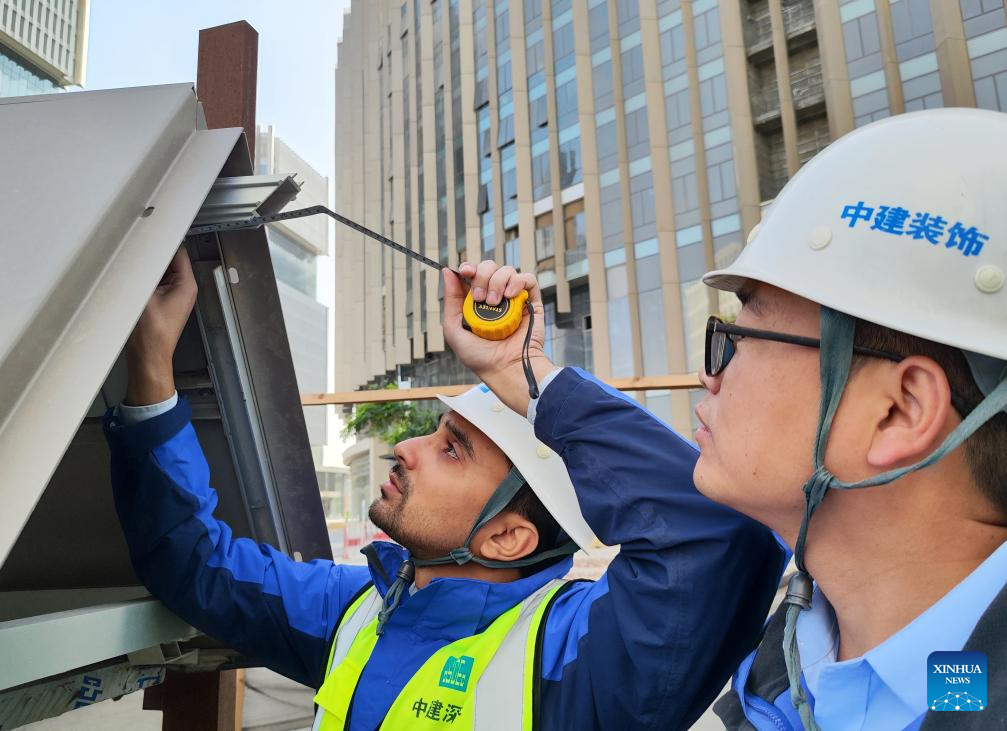
Xu Xiaoxiao (R), a project manager of China Construction Shenzhen Decoration company, works with Egyptian curtain wall engineer Ahmed Elsayed Mohamed to measure the aluminium component for installing the curtain wall at the Central Business District (CBD) of Egypt's new administrative capital, 45 kilometers east of Cairo, Egypt, Nov. 27, 2023. In the vast and scorching desert in North Africa, Chinese and Egyptian workers are working against the clock to dress up a cluster of newly erected high-rises in glass walls made in China.
The new capital is not only a key project of the China-proposed Belt and Road Initiative but also the largest project constructed by Chinese companies in Egypt.
After four years of construction, the modern city is finally taking shape, with a cluster of glass buildings shining like a mirage amidst the arid landscape.
Located near the Sahara Desert, Egypt's climate is predominantly hot and dry, and the highest temperature can reach 50 degrees Celsius in summer. Under such an extreme environment, installing glass walls for these skyscrapers requires impeccable craftsmanship and top-notch materials, in which Chinese builders have stood out when compared to their Western counterparts.
By the spring of next year, all the curtain walls of the CBD will be installed completely. The CBD will continue to radiate the glory of the China-Egypt friendship, serving as an enduring symbol of the Belt and Road Initiative. (China Construction Shenzhen Decoration company/Handout via Xinhua)
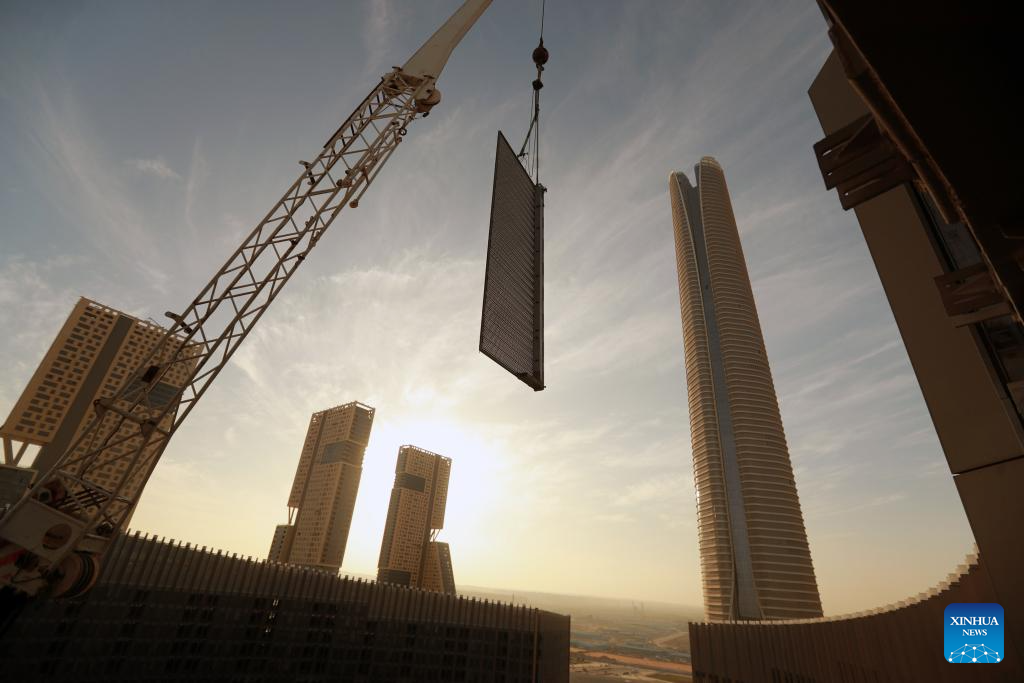
This photo taken on Nov. 22, 2023 shows the installation work of the curtain wall at the Central Business District (CBD) of Egypt's new administrative capital, 45 kilometers east of Cairo, Egypt. In the vast and scorching desert in North Africa, Chinese and Egyptian workers are working against the clock to dress up a cluster of newly erected high-rises in glass walls made in China.
The new capital is not only a key project of the China-proposed Belt and Road Initiative but also the largest project constructed by Chinese companies in Egypt.
After four years of construction, the modern city is finally taking shape, with a cluster of glass buildings shining like a mirage amidst the arid landscape.
Located near the Sahara Desert, Egypt's climate is predominantly hot and dry, and the highest temperature can reach 50 degrees Celsius in summer. Under such an extreme environment, installing glass walls for these skyscrapers requires impeccable craftsmanship and top-notch materials, in which Chinese builders have stood out when compared to their Western counterparts.
By the spring of next year, all the curtain walls of the CBD will be installed completely. The CBD will continue to radiate the glory of the China-Egypt friendship, serving as an enduring symbol of the Belt and Road Initiative. (Xinhua/Sui Xiankai)
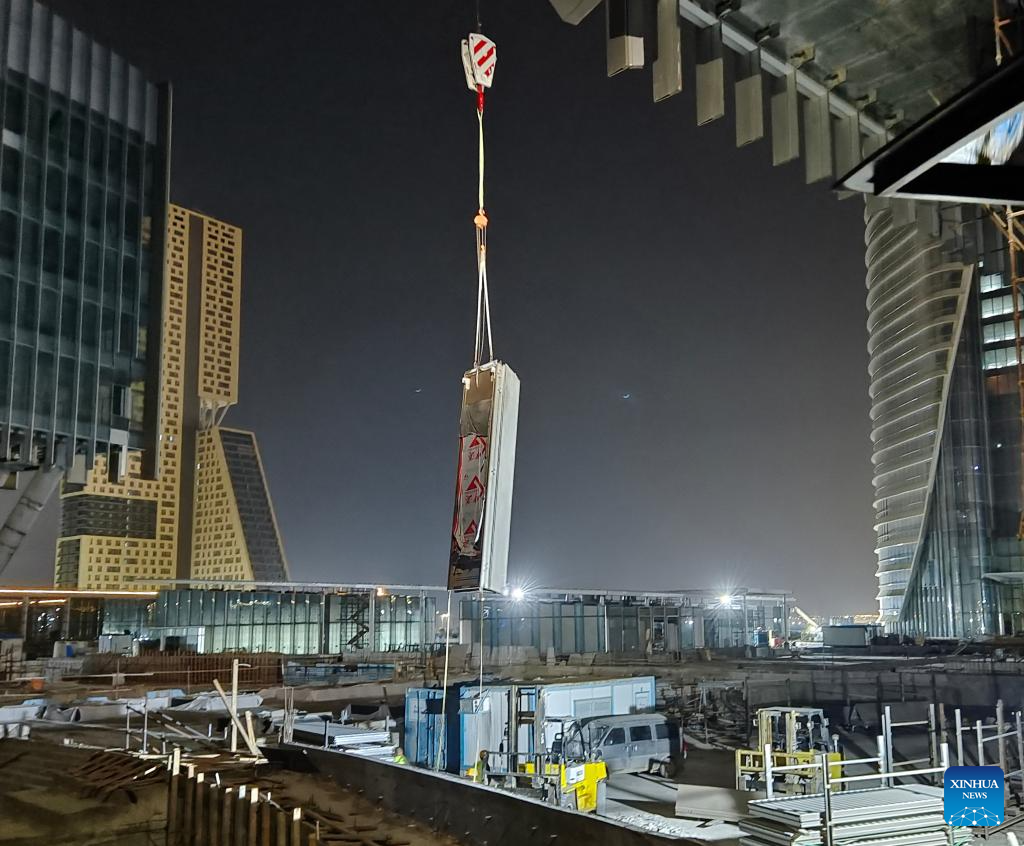
This cellphone photo taken on May 24, 2023 shows the installation work of the curtain wall at the Central Business District (CBD) of Egypt's new administrative capital, 45 kilometers east of Cairo, Egypt. To avoid the high temperature at day time, workers often carry out the construction work at night time. In the vast and scorching desert in North Africa, Chinese and Egyptian workers are working against the clock to dress up a cluster of newly erected high-rises in glass walls made in China.
The new capital is not only a key project of the China-proposed Belt and Road Initiative but also the largest project constructed by Chinese companies in Egypt.
After four years of construction, the modern city is finally taking shape, with a cluster of glass buildings shining like a mirage amidst the arid landscape.
Located near the Sahara Desert, Egypt's climate is predominantly hot and dry, and the highest temperature can reach 50 degrees Celsius in summer. Under such an extreme environment, installing glass walls for these skyscrapers requires impeccable craftsmanship and top-notch materials, in which Chinese builders have stood out when compared to their Western counterparts.
By the spring of next year, all the curtain walls of the CBD will be installed completely. The CBD will continue to radiate the glory of the China-Egypt friendship, serving as an enduring symbol of the Belt and Road Initiative. (China Construction Shenzhen Decoration company/Handout via Xinhua)
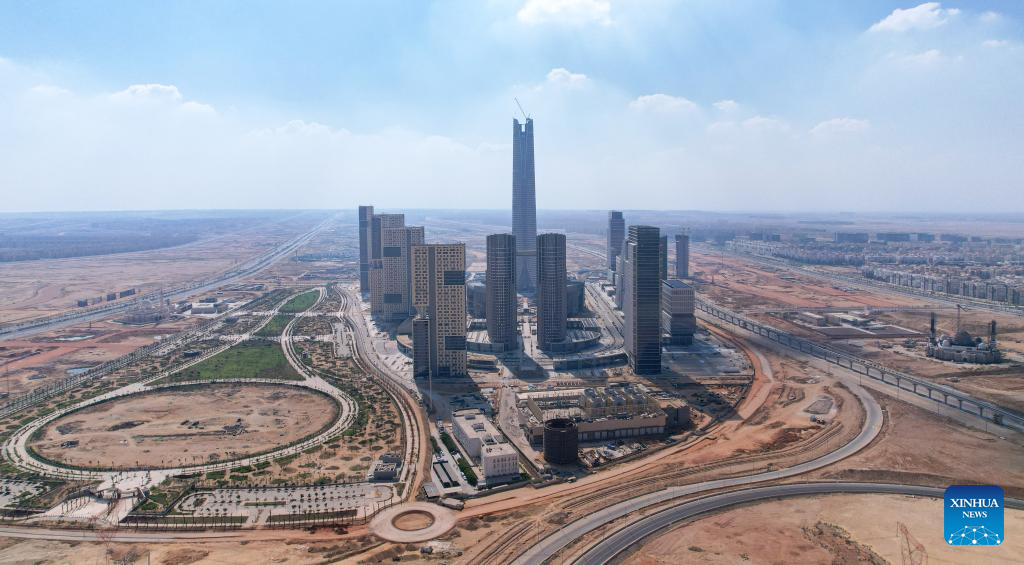
This aerial photo taken on June 28, 2023 shows the Central Business District (CBD) of Egypt's new administrative capital, 45 kilometers east of Cairo, Egypt. In the vast and scorching desert in North Africa, Chinese and Egyptian workers are working against the clock to dress up a cluster of newly erected high-rises in glass walls made in China.
The new capital is not only a key project of the China-proposed Belt and Road Initiative but also the largest project constructed by Chinese companies in Egypt.
After four years of construction, the modern city is finally taking shape, with a cluster of glass buildings shining like a mirage amidst the arid landscape.
Located near the Sahara Desert, Egypt's climate is predominantly hot and dry, and the highest temperature can reach 50 degrees Celsius in summer. Under such an extreme environment, installing glass walls for these skyscrapers requires impeccable craftsmanship and top-notch materials, in which Chinese builders have stood out when compared to their Western counterparts.
By the spring of next year, all the curtain walls of the CBD will be installed completely. The CBD will continue to radiate the glory of the China-Egypt friendship, serving as an enduring symbol of the Belt and Road Initiative. (Li Binghong/Egyptian branch of China State Construction Engineering Corporation/Handout via Xinhua)
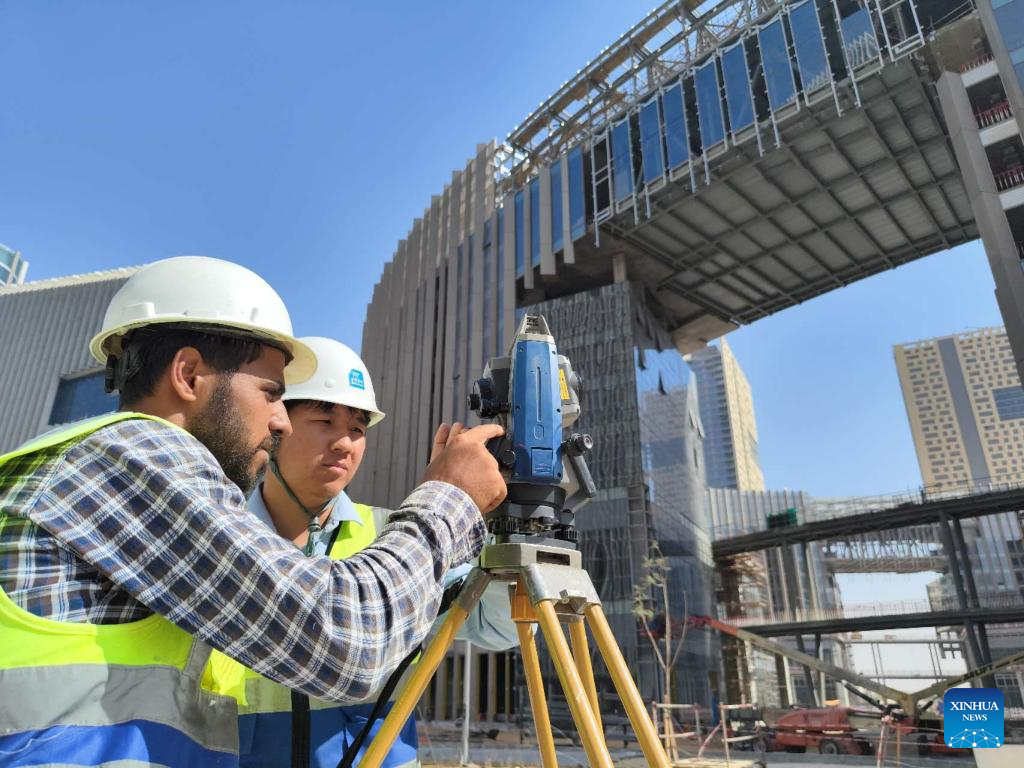
Chinese and Egyptian workers carry out measuring work together at the Central Business District (CBD) of Egypt's new administrative capital, 45 kilometers east of Cairo, Egypt, Sept. 24, 2023. In the vast and scorching desert in North Africa, Chinese and Egyptian workers are working against the clock to dress up a cluster of newly erected high-rises in glass walls made in China.
The new capital is not only a key project of the China-proposed Belt and Road Initiative but also the largest project constructed by Chinese companies in Egypt.
After four years of construction, the modern city is finally taking shape, with a cluster of glass buildings shining like a mirage amidst the arid landscape.
Located near the Sahara Desert, Egypt's climate is predominantly hot and dry, and the highest temperature can reach 50 degrees Celsius in summer. Under such an extreme environment, installing glass walls for these skyscrapers requires impeccable craftsmanship and top-notch materials, in which Chinese builders have stood out when compared to their Western counterparts.
By the spring of next year, all the curtain walls of the CBD will be installed completely. The CBD will continue to radiate the glory of the China-Egypt friendship, serving as an enduring symbol of the Belt and Road Initiative. (China Construction Shenzhen Decoration company/Handout via Xinhua)
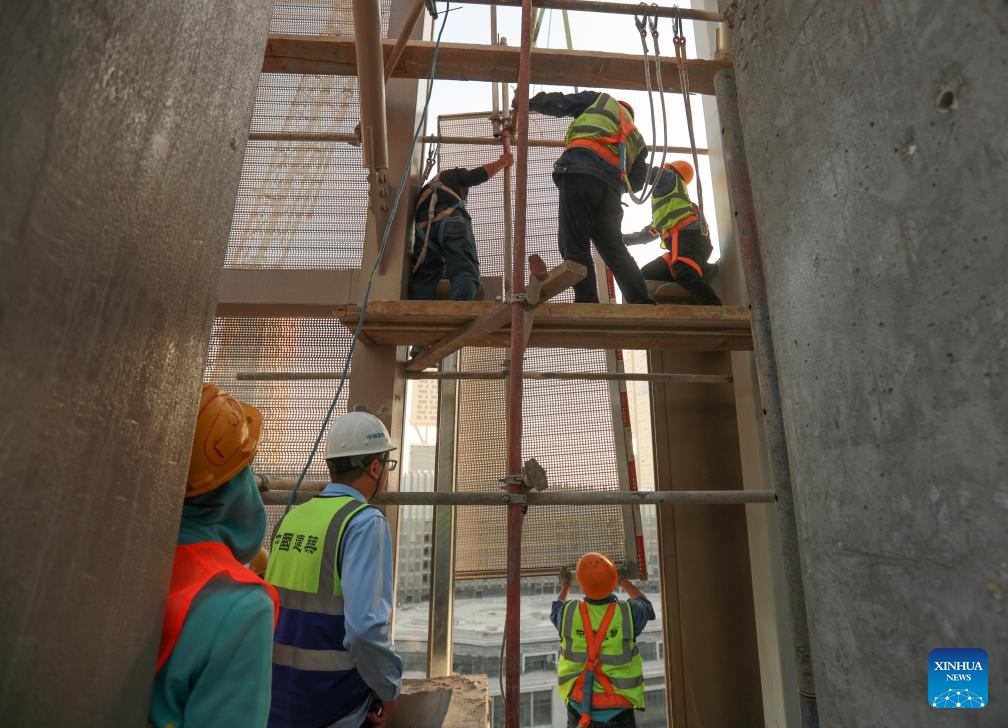
Workers install the curtain wall at the Central Business District (CBD) of Egypt's new administrative capital, 45 kilometers east of Cairo, Egypt, Nov. 22, 2023. In the vast and scorching desert in North Africa, Chinese and Egyptian workers are working against the clock to dress up a cluster of newly erected high-rises in glass walls made in China.
The new capital is not only a key project of the China-proposed Belt and Road Initiative but also the largest project constructed by Chinese companies in Egypt.
After four years of construction, the modern city is finally taking shape, with a cluster of glass buildings shining like a mirage amidst the arid landscape.
Located near the Sahara Desert, Egypt's climate is predominantly hot and dry, and the highest temperature can reach 50 degrees Celsius in summer. Under such an extreme environment, installing glass walls for these skyscrapers requires impeccable craftsmanship and top-notch materials, in which Chinese builders have stood out when compared to their Western counterparts.
By the spring of next year, all the curtain walls of the CBD will be installed completely. The CBD will continue to radiate the glory of the China-Egypt friendship, serving as an enduring symbol of the Belt and Road Initiative. (Xinhua/Sui Xiankai)
点击右上角![]() 微信好友
微信好友
 朋友圈
朋友圈

请使用浏览器分享功能进行分享
